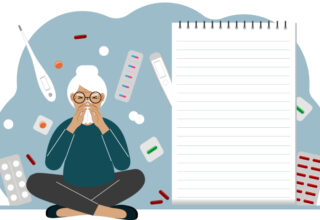We have all had stomach aches at some point — that uncomfortable feeling in your belly that can catch you off guard. But not every abdominal pain is the same, and it can come from a variety of causes. Sometimes it’s just something you ate. Other times it might be your body’s way of telling you something more serious is going on.
Let’s break down what abdominal pain actually means, what are its common causes and associated symptoms. And when is the time to see a doctor.
What is Abdominal Pain?
Abdominal pain is the discomfort or pain you feel anywhere in your belly area — from your chest to your pelvis. We often call abdominal pain as stomach pain, but the pain in your abdomen can be coming from other organs too. Your abdomen (belly) houses many organs including:
- Stomach
- Liver
- Gallbladder
- Pancreas
- Intestines (Small and large)
All of these organs are part of your digestive system. However it is not necessary that every abdominal pain arises from these organs. Sometimes pain comes from the abdominal wall — that’s the layer of muscles and skin that forms the outer part of your belly.
Sometimes, what feels like abdominal pain may actually be coming from other parts of your body like chest, back, or pelvis.
Abdominal pain can show up in many ways for a variety of causes. It might feel:
- Mild or severe
- Dull, sharp, or stabbing
- Burning
- Crampy or colicky
- On and off or continuous
- Acute or chronic
- Localised (focused at one point) or generalised (spread out across your whole abdomen)
Common Symptoms Associated with Abdominal Pain:
Depending upon what’s causing your pain, you may experience other symptoms like:
- Bloating or feeling of fullness
- Nausea or vomiting
- Diarrhea or constipation
- Gas or burping
- Fever
- Loss of appetite
- Pain that worsens after eating
- Pain that moves (eg. starting from the belly button and then moving to one side)
Common Causes of Abdominal Pain:
The abdominal pain can be caused by something as simple as indigestion or as complex as an inflamed appendix. That’s why it is very important to see your doctor if you don’t know what’s causing your pain. Don’t make a self-diagnosis.
Here are some of the common reasons why you might feel pain in your abdomen:
- Indigestion or Gas: Overeating, eating too quickly, or eating spicy or fatty food can lead to bloating and gas buildup, which causes a feeling of fullness and discomfort.
- Constipation: When stool builds up in the intestines, it can cause cramping and pain, especially in the lower abdomen.
- Food poisoning: It is often caused by taking contaminated food or water and causes symptoms like abdominal cramps, nausea, vomiting, and diarrhea.
- Food Intolerances or Allergies: Lactose intolerance or gluten sensitivity can trigger abdominal bloating, cramping, and gas after eating certain foods.
- Irritable Bowel Syndrome (IBS): It is a long term condition that can cause abdominal pain along with changes in bowel habits like diarrhea, constipation, or both.
- Acid Reflux (GERD): It causes a burning pain in the upper abdomen or chest (heartburn).
- Menstrual Cramps: Pain in the lower abdomen in women may be linked to menstrual cycle.
- Urinary Tract Infections (UTIs): Sometimes pain in the lower abdomen is due to an infection in the bladder, especially if it comes with burning urination and frequent urge to go.
- Appendicitis: This is a medical emergency. It usually starts with the pain near the belly button that shifts to the lower right side of the abdomen and worsens over time. It may also come with fever and vomiting.
- Gallstones: These can cause severe pain in the center of your tummy or just under your ribs on the right hand side.
- Kidney Stones: They cause pain that can go down to your groin. It can be accompanied with nausea and painful urination.
There are many other reasons that can cause abdominal pain. These can range from non-serious to serious causes. So it is important to always check with your doctor for an early diagnosis and treatment.
General Management For Mild Abdominal Pain At Home:
If you are sure that your abdominal pain is due to digestion and is not accompanied by any red flag symptoms, you can begin with some general measures to manage your pain at home:
- Rest and give your body some time to recover.
- Hydration: Sip water or clear fluids, especially if you have had vomiting or diarrhea.
- Light Diet: Eat easy-to-digest foods like toast, rice, and bananas.
- Use warm compresses or heating pads on your abdomen to help ease your cramps.
- Avoid trigger foods. Stay away from spicy, greasy, or acidic foods until you feel better.
- If constipation is the issue, try taking more fiber and staying active.
- For indigestion, over-the-counter antacids might help.
Always talk to your healthcare provider before taking any medications.
When Should You See a Doctor:
If you are not sure what’s causing your abdominal pain, you should see your healthcare provider. As some types of abdominal pain require urgent care. You should seek medical attention if you experience:
- Unexplained abdominal pain
- Severe or persistent pain that doesn’t get better
- Pain that wakes you up at night
- Fever
- Persistent Vomiting
- Blood in vomit, stool, or urine
- Swelling or tenderness in the abdomen
- Yellowing of the skin and eyes (jaundice)
- Difficulty passing gas or stool
- Black, sticky, and extremely smelly stools
- Difficulty breathing
- Difficulty swallowing food
Final Thoughts:
Abdominal pain is common and most of the time it’s not a cause for panic. But your belly houses many important organs, and when something isn’t right, it’s your body’s way of waving a red flag. Pay attention to your symptoms and don’t hesitate to seek medical help when something doesn’t feel right.








